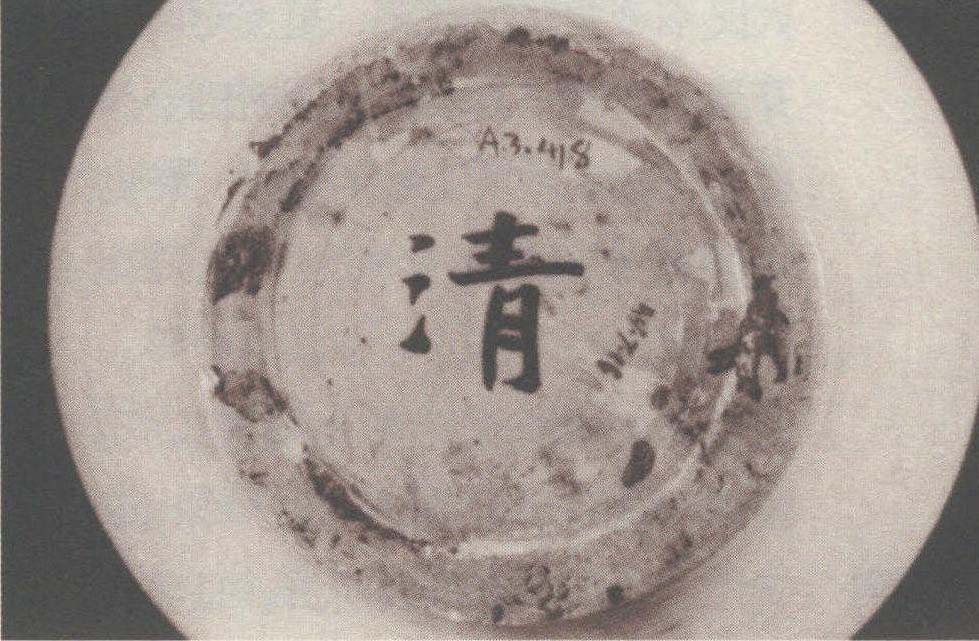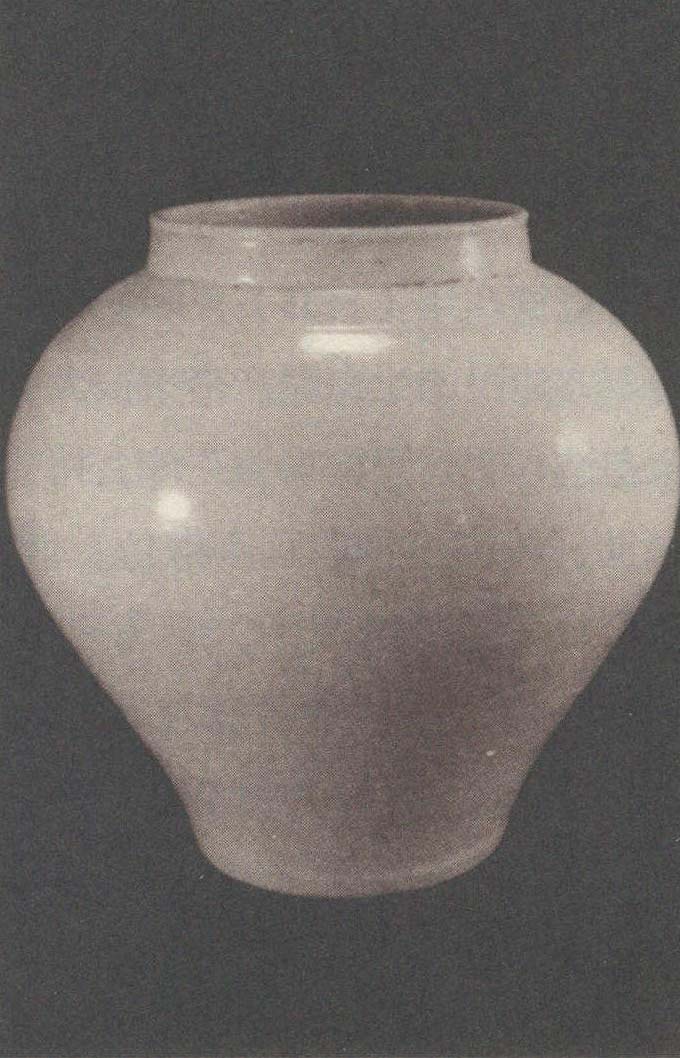徐琦 (1385~1453),明朝大臣。字良玉。祖籍钱塘(今浙江杭州),后因祖父犯罪被谪贬到宁夏戍边,就以宁夏为籍贯。徐琦自幼聪颖好学,天资笃实,过目不忘,被誉为 “塞上神童” 。永乐六年(1408),二十三岁乡试中举。永乐十三年(1415),高中进士。
徐琦进入官场之后,很快就从行人升任兵部员外郎。宣德六年(1431),被提拔为右通政,作为代表明廷出使安南(今越南北部地区)礼部侍郎章敞的副使,赴安南策封黎利为国王。他在外交公务中,既能坚持原则,严斥安国“白相见礼”的不友好做法,又注意团结该国臣民,洁身自重,不接受馈赠,保持了大国使节清正廉明的形象,顺利完成了外交使命。章敞对于这位有才学、务实肯干的助手十分满意,回国后向朝廷报告了他首次出国的良好表现和杰出的德能,很快就被重用,升任兵部右侍郎。
宣德八年 (1433),明朝与安南的关系恶化,并发展到军事对抗,给双方边民的生命财产带来很大的损失。为了挽救危局,重建两国的传统友谊,明廷派徐琦为正使,持节出使安南。这时正值安南老国王黎利去世,新国王黎麟刚刚继位,在少数大臣的唆使下,新国王不明真相,一时对于来之不易的两国睦邻友好关系产生动摇,使中安两国的和平友好关系受到严重挑战。徐琦临危受命,坦言向安国君臣“谕以顺天保民之道”。他还直接做安国文武大臣们的工作,主动拜会新王黎麟,向他陈述两国友好的重要性,认为人民不希望两国交恶,更反对两国开战,请黎王放心,大明帝国会像以往一样保护黎王室的利益,帮助安国稳定国内社会秩序,发展生产,使人民安居乐业,共享升平。但是,如果国王听信小人谗言,不顾社稷安危和百姓的死活,作出亲者痛、仇者快的错误决策,是要对不起两国人民的。由于“琦晓以祸福,麟惧,铸代身金人,贡方物以射” 。新王在大明使臣徐琦正义言行的感召下,继承老王制定的中安世代友好的国策,重修两国旧好,在中安关系史上写下了光辉的一页。徐琦在出使安国期间,也不像有些使者那样,因“安南多宝货” ,“常以水道挟估客往以为利” ,让“安人颇轻之” 。他拒受一切礼物,受到安国君臣的尊重,在安国朝野有很高的威信。皇帝朱瞻基对他的表现十分高兴,当他回国后马上召见,并在宫中设御宴款待他,宴后又赐予丰厚的赏赐。为了表彰徐琦,经朝廷恩准,撤销对他先祖被降为戍籍发配到宁夏守边的处分,恢复了徐家一门的民籍。

(明) 白釉 “清” 字罐
White Glaze Pot with "Qing"(Ming Dynasty)

(明) 白釉 “清” 字罐
White Glaze Pot with "Qing"(Ming Dynasty)
正统初,南直一带(东南诸省)多灾,徐琦受命与工部侍郎郑辰共同考察南畿地区的大小官府,秉公执法,果断查处三十多名官员,并条陈 “弭灾十事” ,挽救了大批江南人民的生命财产。这两桩业绩在朝野传为佳话。正统五年 (1440),他开始进入最高层政治决策圈,亲身参赞机务。正统十四年(1449),在任兵部尚书时,朝廷出于政治原因,接受某些大臣的建议,正计划迁都北京后,留在南京的官兵家属全部搬迁到北方各地驻军的城乡进行安置。此举引起了大部分军人和家属的不满和骚动,廷臣们虽担心会出事,但官场积习已深,为了保官和一己私利,谁也不愿为将士们冒险进言。而徐琦看到了问题的严重性和紧迫性,把自己的身家性命置之度外,勇敢上奏。他说: “安土重迁,人之情也。今骤徙数万人,人心一摇,事或叵测。”竭力劝阻了这件事的实施,为国家消除了一次可能发生的大动荡。他主持兵部期间,还看到边关地区实行军政合一的军屯建制,这些军卫地区没有像府县地区那样层层建立儒学,这就使边地官兵的子弟失去了享受平等受教育的权利。更重要的是,在科举选仕制度下,也就等于失去了公平晋升的机会,这种不合理现象如果得不到纠正,将来有一天会国门无人愿守,边关难以巩固,国基就会受到威胁。在他的大力呼吁下,朝廷也认清了问题的严重性,批准了他提出的 “天下卫所视州县例皆立学” 的请求。从此边疆军卫地区儒学大兴,风气大开,为国家培养了大批有用的人才,也对边疆的巩固与开发起到了重要的作用。
徐琦人品淳正,居官务持大体,故权重而主不疑,势倾而僚不妨,尤其是安南君臣一直把章敞、徐琦和后来的刘戬(弘治间使节)三位大使视为中国的化身而倍加敬重,在邻国上下享有很高的名望。安南使臣曾对明朝官员说: “安南草木,亦知公名。”明代宗朱祁钰给这位德高望重、一生处事 “镇静安详” 的老臣予以最高的荣誉,封赠太保。
景泰四年(1453)徐琦病逝在任所,享年六十八岁。谥“贞襄” 。家乡官商绅农各界在宁夏镇城为他建立牌坊,上书“司马”两个大字,作为第二故乡人民对他的纪念,并尊他为 “乡献之首” 。
Xu Qi (1385-1453),a minister of Ming Dynasty,styled himselfLiangyu. His ancestral home was in Qiantong city (Hangzhou citytoday). Then his family was banished to a frontier post in Ningxiabecause his grandfather had committed a crime,so NingXia became his nativeplace. Xu Qi,even in his childhood,was intelligent and found of learning,hadsound talents and a very retentive memory. He was praised as "a child prodigybeyond the great wall". In the sixth year of Yongle(1408),when he wastwenty-three years old,Xu Qi was selected as juren after taking a provincialselection of juren out of xiucai (held triennially in various provincial capitals). Inthe thirteenth year of Yongle(1415),he became a great successful candidate inthe highest imperial examinations.
After entering officialdom,Xu Qi was promoted from xingren(a low rankancient official title) to yuanwailang(a high rank ancient official title) on theBoard of War. In the sixth year of Xuande(1431),he was promoted to youtongzheng (an ancient official title),and acted as a deputy to shilang Zhang Chang(an ancient offical rank) on the Board of Rites. On behalf of Ming Monarch,they went to Annan (northern Viet Nam today) to make Li Li a king. Whendealing with foreign affairs,he not only adhered to principles by severecriticizing Annan's unfriendly way of doing things which did no abide bydiplomatic etiquette,but also paid attention to uniting people of that country byconducting himself with dignity and refusing gift. He maintained the upright,just and incorruptible image of diplomatic envoy from a great country,andcompleted the diplomatic mission successfully. Zhang Chang was very satisfiedwith this talented,learned and pragmatic assistant,who was willing to work,andreported Xu Qi's good performance and outstanding virtue and ability of hisfirst envoy to court. Xu Qi was put into important position soon and promotedto youshilang in Nanjin on the Board of War.
In the eighth year of Xuande (1433),the relationship between Ming Monarchand Annan was getting worse and worse that they confronted each othermilitarily and people of both countries on the board suffered heavy losses. Inorder to retrieve the critical situation and rebuild two nations' traditionalfriendship,Xu Qi was sent to Annan as the chief ambassador who hold theimperial insignia. At this time the old king Li Li of Annan died and the newking Li Lin succeeded to the throne. Instigated by some ministers,the new kingwas unaware of the truth and shaked the hard down good-neighborrelationship. The peaceful and friendly relationship of two nations was at theedge. Being ready to give his life in times of national danger,Xu Qi informedthe king and ministers of Annan frankly the way of going with the tide ofhistory and protecting people. He convinced both the civil and militaryministers of Annan personally and called on the new king Li Li,telling him theimportance of two nations' good relationship . He thought that people of bothcountries did not like bad neighbor relation of two nations,not to say a war. Heassured the king that Ming Monarch would protect royal family's benefit,helpmaintain social order,develop production,people would live and work in peaceand contentment in Annan,and both countries could enjoy peace. On thecontrary,if he did not take the safety of his country and people intoconsideration but believed small men's slanderous talk and made a wrongdecision which would sadden his own folk and gladden the enemy,he wouldlet people of both nations down and became the enemy of people and a personcondemned by history. Xu informed the king the consequences and Li agreedwith subjecting to Ming Monarch. He had a golden man,which would be onbehalf of him,casted and sent it to Ming Monarch. Influenced by Xu's justwords and deeds,the new king followed the old king's national policy of beingfriendly with Chnia forever,rebuilt two nations' good relationship,and openedup a glorious page of two nations' relationship. During his envoy in Annan,unlike some ambassadors,Xu refused all the gifts and was respected by both theking and ministers,had high prestige in Annan court as well. Greatly pleasedwith Xu,the Ming emperor Zhu zhanji met Xu immediately when he returned,invited him to have dinner in his palace,and gave him a handsome reward. Inorder to reward Xu Qi,the court also countermand the order of banishing hisancestor to guard frontier in Ningxia and replace their frontier ID (with whichthe holder and descends can only guard the frontier pass (generation aftergeneration) with Min ID (with which the holder and his descendents can movefreely).
In the first few years of Zhengtong,the area around Nanzhi (southeasternprovinces) suffered disasters. Xu Qi and shilang Zhan Chen on the Board ofWorks were ordered to investigate local authorities in Nanji area. They handledmaters impartially,investigated and prosecuted more than thirty officialsdecisively and stated ten items to their superior about putting end to disasters,thus saved lots of lives and property. These two achievements became stories onofficials' lips. In the fifth year of Zhengtong (1440),Xu entered the highestpolitical decision-making circle participating in important affairs in Nanjin. Inthe fourteenth year of Zhengtong(1449),because of some ministers' suggestionsand political reasons,the court was planning to move and place Nanjin officers'wife and children,who,after moving the capital to Beijin,were still in Nanjin,to northern cities and villages. Xu was the minister on the Board of War then.The suggestion mentioned above caused a grievance and commotion amongmost of the army men and their families. Though officials were anxious for itwas going wrong,no one was willing to run the risk of offering an opinion tothe court and helping army men in order to maintain their own position andproperty and follow old habit in the officialdom. Seeing that the problem wascritical and pressing,Xu Qi gave no thought to his personal safety and that ofhis families,but reported to the emperor that " it is people's nature to hate toleave their native land. If thousands of people were moved,people's moralwould be seriously affected and it would be hard to predict what will happen tous. "Xu tried his utmost to stop this moving thus a possible popular anxiety ofhis country was avoided. When he was in charge of the Board of War,Xunoticed that,in frontier areas,military and administration were combined toform a troop organizational system. Unlike other areas,there were noConfucian schools at each level here,thus soldiers' children were preventedfrom the equal right of receiving education. What was more important was thatit meant these children lost the equal chance of pursuing their official careerbecause official was selected according to imperial examination system. If thisinappropriate situation could not be improved,no one would be willing toguard the gateway of their country in the future. If frontier pass could no bestrengthened,the cornerstone of their country would be in danger. After hisappealing with great effort,the court realized it very critical and approved Xu'srequest of setting up schools in frontier troop station area as did in other areas. Itbecame a common practice since then,trained many qualified personnel for thecountry,and played important role in strengthening and developing frontierarea.
Xu Qi was trusted by both the emperor and his fellow men,because hewas a person of excellent character and official of taking the overall situationinto account. Especially in Annan Zhang Chang,Xu Qi and later ambassadorLiu Jian (in Hongzhi period) were respected and regarded as China incarnate byking and officials,and enjoyed tremendous popularity in neighbor nation.Ambassador from Annan told officials of Ming Monarch "Everyone knows Xuin Annan." Emperor Zhu Qiyu granted this old minister the highest honor,called him Taibao. Because in all his life,Xu was "calm and unruffled",and aperson of noble character and high prestige.
In the forth year of Jintai(1453),when he was sixty- eight years old,Xu Qidied of illness in his official residence. His posthumous title was "Zhenxiang".There was a memorial archway set up by Ningxia people for him in Ningxia,which was his second home town. Two big Chinese characters "Sima (司馬)"was written on the archway. In memory of him,the people there regarded himas "the most eminent townsman".
本文地址: https://www.yishiweijian.com/renwu/2022123845.html
文章来源:主编
版权声明:除非特别标注,否则均为本站原创文章,转载时请以链接形式注明文章出处。
2023-02-15主编
2023-02-15主编
2023-02-15主编
2023-02-15主编
2023-02-15主编
2023-02-15主编
2023-02-15主编
2023-02-15主编
2023-02-15主编
2023-02-15主编
2022-11-29主编
2022-11-29主编
2022-11-23主编
2022-11-18主编
2022-12-08主编
2022-12-08主编
2022-12-02主编
2022-11-29主编
2022-11-29主编
2023-01-03主编
2022-10-27主编
2022-10-26主编
2022-10-27主编
2022-10-26主编
2022-10-27主编
2022-10-27主编
2022-10-27主编
2022-10-27主编
2022-10-27主编
2022-10-27主编
扫码二维码
获取最新动态
